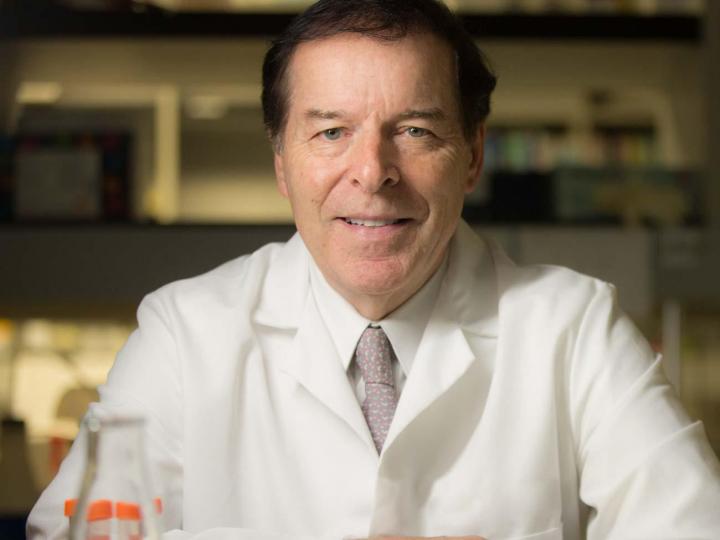
Credit: Sanford Burnham Prebys
LA JOLLA, CALIF. – May 14, 2019 – KRAS is one of the most challenging targets in cancer. Despite its discovery more than 60 years, researchers still struggle to inhibit its mutated form–earning its reputation as “undruggable.” Yet, the hunt for an Achilles’ heel continues, as cancers driven by KRAS mutations are both common and deadly.
Now, scientists from Sanford Burnham Prebys and PHusis Therapeutics have shown that a compound called PHT-7.3 shrinks KRAS-driven tumors in mice. In contrast to directly targeting mutant KRAS, the potential drug candidate targets the protein’s partner in crime: the cellular scaffold to which mutated KRAS attaches. The study was published in Cancer Research.
“Researchers have successfully developed personalized therapies for other mutations known to drive cancer growth, such as EGFR and BRAF. However, KRAS has remained infamously elusive,” says Garth Powis, D.Phil, senior author of the paper, director of Sanford Burnham Prebys’ NCI-designated Cancer Center and scientific co-founder and adviser to PHusis Therapeutics. “Our study identifies a promising compound that has the potential to become a much-needed treatment for KRAS-driven cancers, an important advance for the millions of people around the world who are fighting this deadly cancer type.”
KRAS is a protein that regulates cell growth. If it becomes mutated, it can get stuck in the “always on” conformation, leading to the uncontrolled cellular growth that causes cancer. The mutation occurs in approximately 25 percent of all human cancers, including more than 90 percent of pancreatic cancers, 35 to 45 percent of colorectal cancers and approximately 25 percent of lung cancers. There is currently no effective treatment for KRAS-positive cancers.
“Mutated KRAS is firing all the time–similar to speedily typed Morse code versus a calm, intermittent key tap,” explains Powis. “This out-of-control signaling drives tumor growth–and is particularly insidious because it overpowers targeted therapies that may otherwise have been able to treat the cancer.”
In the study, the scientists focused on mutant KRAS’ accomplice, a protein called Cnksr1 (connector enhancer of kinase suppressor of Ras 1). Mutant KRAS floats to the cellular membrane and attaches to this scaffold to become active. After demonstrating that inhibiting Cnksr1 halts the growth of lung and colon cancer cells, the researchers conducted molecular modeling and structural modifications to identify PHT-7.3. This small molecule probe–the starting point for further drug development–shrank KRAS-driven tumors in a mouse model of non-small-cell lung cancer. Importantly, the compound did not affect the function of healthy KRAS–indicating that potential side effects may be limited.
PHT-7.3 is currently undergoing lead optimization activities and preclinical development by PHusis Therapeutics.
###
The co-first authors of the study are Martin Indarte, Ph.D., of PHusis Therapeutics; and Roisin Puentes, Ph.D., of Sanford Burnham Prebys.
Additional authors include Marco Maruggi, Ph.D., Geoffrey Grandjean, Ph.D., Robert Lemos Jr., Fabiana I. A. L. Layng, Ph.D., Ricardo G. Correa, Ph.D., Laurie A. Bankston, Ph.D., and Robert C. Liddington, Ph.D., of Sanford Burnham Prebys; Nathan T. Ihle, Ph.D., formerly of University of Texas MD Anderson Cancer Center and currently of Pfizer; Zamal Ahmed, Ph.D., Shuxing Zang, Ph.D., Lei Du-Cuny, Ph.D., of University of Texas MD Anderson Cancer Center; and Emmanuelle J. Meuillet, Ph.D., Michael Scott and Lynn Kirkpatrick, Ph.D., of PHusis Therapeutics.
The study’s DOI is 10.1158/0008-5472.CAN-18-2372.
Research reported in this press release was supported by the U.S. National Institutes of Health (NIH) (CA185054, CA201707 and P30CA030199). The content is solely the responsibility of the authors and does not necessarily represent the official views of the NIH.
About Sanford Burnham Prebys Medical Research Institute
Sanford Burnham Prebys is a preeminent, independent biomedical research institute dedicated to understanding human biology and disease and advancing scientific discoveries to profoundly impact human health. For over 40 years, our research has produced breakthroughs in cancer, neuroscience, immunology and children’s diseases, and is anchored by our NCI-designated cancer center and advanced drug discovery capabilities. For more information, visit us at SBPdiscovery.org or on Facebook at facebook.com/SBPdiscovery and on Twitter @SBPdiscovery.
Media Contact
Susan Gammon, Ph.D.
[email protected]
Related Journal Article
http://dx.




